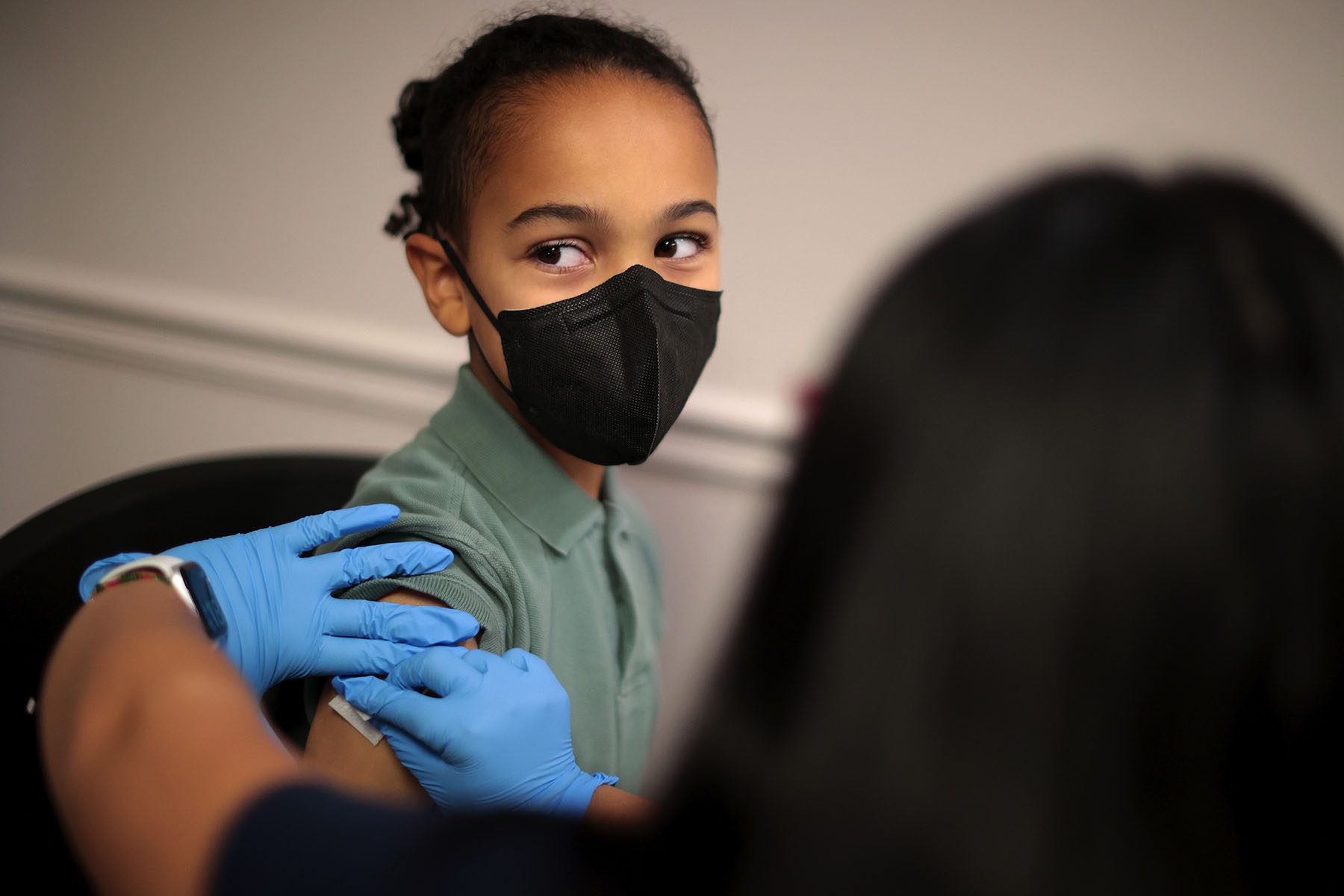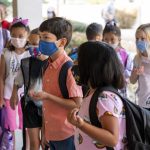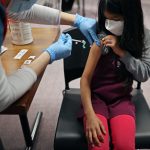From the jump, Dr. Megan Ranney did everything she could to keep her kids safe.
While pregnant, she read books about how to have a healthy pregnancy. She researched the safest cribs and car seats. As her kids — now 10 and 13 — grew older, she made sure they wore proper helmets on their bicycles and researched the nitrous oxide their dentist used.
And when federal health authorities deemed both her children eligible for a COVID-19 vaccine, Ranney took the exact same approach: reading the medical literature, evaluating the benefits and the risks of the Pfizer vaccine now being recommended for kids 5 and older.
“At each stage of their lives I’ve done the best to do what science shows is safe for them,” said Ranney, an associate professor of emergency medicine at Brown University.
The evidence, Ranney found, was overwhelming: “These vaccines are tremendously safe,” she said. “They work better than most vaccines.”
Her 13-year-old got vaccinated soon after she was eligible. Ranney’s 10-year-old son had an appointment to get his first shot on November 13, with the second dose three weeks later. On that schedule, he would be considered fully vaccinated by December 18 — just a week before Christmas.
The majority of American parents have so far indicated some level of skepticism about vaccinating young children against the virus. A poll released Monday from The Washington Post and ABC News found that only 46 percent of parents thought the vaccine was safe for kids 5 to 11. About 4 in 10 parents were “not at all confident” in its safety, and another 11 percent were “not so confident.”
In a previous October poll from the Kaiser Family Foundation (KFF), before the vaccine was authorized, only 27 percent of parents with a child aged 5 to 11 said they would get their kid vaccinated “right away,” if a shot met the Food and Drug Administration’s emergency authorization standards. One in 3 parents said they would “wait and see” if the vaccine were safe. And 3 in 10 parents said they would “definitely not” seek out a vaccine for their kid.
In interviews with The 19th, public health experts who are also mothers noted that medical decisions parents make for their children can be emotionally fraught. But still, they said, the Pfizer vaccine is safe and effective. Communicating that in a way that is understanding, empathetic and fact-based will be critical in helping kids get immunized.
“It is one thing to make a decision for your own self, and it’s another to make a decision for your child. It has a different weight. As a parent, I completely understand,” said Jennifer Kates, a senior vice president and global health expert at KFF. “There’s a lot of parents who don’t think twice about getting their kids basic immunizations who are nervous about this. It’s about speaking to them and explaining how vaccines work and why they’re so important.”
Kates’ 6-year-old son got his first shot November 7. He had a sore arm but no other side effects. By the time he is fully vaccinated — two weeks after his second shot — he will be creeping up on his seventh birthday.
He was eager to get a shot, Kates said — and not just because of his parents.
“Kids do pay attention. They hear and experience what the world has gone through. It isn’t just what their parents tell them. They are in school and have friends and teachers. Understanding their feelings is really important, too,” she added. “I told my son, ‘There’s some kids in your class who are afraid of the shots, so you might want to talk to them.’”
Medical experts widely agree that the pediatric Pfizer shot is incredibly effective and very safe. The benefits far outweigh the risks, especially compared with the concern of contracting COVID-19. The Advisory Council on Immunization Practices, whose non-binding votes typically shape CDC guidance, voted 14-0 in favor of recommending the vaccine for kids in this age group. The federal government has allocated money for schools to host vaccine clinics, and the U.S. Department of Health and Human Services has encouraged all schools with students age 5 and older to organize onsite vaccination.
Compared with how it affects adults, COVID-19 typically poses less risk for children, particularly those younger than 12. But the more contagious Delta variant shifted things: In the United States, the virus now ranks among the top 10 causes of death for kids age 5 to 11, per data collected by the Centers for Disease Control and Prevention. More than 8,000 in that age bracket have been hospitalized because of the virus, and almost 200 have died.
The version of Pfizer’s COVID vaccine for ages 5 to 11 — which contains a smaller dose than what adults and adolescents are given — has been shown to be 90.7 percent effective in preventing symptomatic COVID-19, per data collected by the company and reviewed by the Food & Drug Administration. Side effects appear minimal. On November 2, the CDC officially recommended that kids between ages 5 and 11 get vaccinated with the Pfizer product.
-
More from The 19th
- White House announces $785 million of pandemic relief funds will support communities of color
- COVID-19 vaccine rollout for children ages 5 to 11 comes with familiar obstacles
- Pregnant patients absorb first COVID-19 vaccine dose more slowly, researchers say. (The second shot works fine.)
Per the KFF poll, the primary cause for vaccine hesitancy are concerns about the vaccines’ long-term effects on children, including fears that it could affect their fertility. (There is no evidence that the vaccine, which has now been given to millions of people, has any such side effects.)
There is some concern that young boys in particular could be susceptible to a condition called myocarditis, an inflammation of the heart that has occurred in rare instances among some older boys and men who have been vaccinated. No myocarditis cases were reported in the pediatric trial for Pfizer’s vaccine, though experts imagine some will eventually be reported.
Ranney, who has a young son, looked at that data too. But ultimately, she said, people who are unvaccinated and contract COVID-19 are far more likely to develop the heart condition than those who are vaccinated.
“That’s not something that scares me about this vaccine,” she said.
She has been getting numerous texts from friends who are wondering whether and how to go about vaccinating their young children. Should they wait for a shot to be available from Moderna, instead? Should they wait a few months for their 11-year-olds to turn 12, and then get a vaccine that will have a larger dose? Should they space out the vaccines more than three weeks?
“I think it comes from the point of view of parents wanting to do the best thing for their kids,” she said. “I tell them I’m going to do what the FDA authorized, and has been shown to be 90 percent effective: two shots, three weeks apart.”
That kind of testimony — from other parents, in similar situations — is invaluable, said Dr. Leana Wen, an emergency physician and visiting public health professor at George Washington University. She cited the role of “mom influencers” in particular.
Also critical, she said, is making sure vaccine appointments work with parents’ and families’ schedules — keeping slots available after work hours, for instance, or relying on school-based vaccination sites — and giving families with fully immunized kids the opportunity to take off masks in more situations, such as a soccer practice or sleepover.
“Making sure they amplify those stories, of moms that did make this decision, why they did it, and what their kids are able to do — that will sway many people,” she said.
Both of Wen’s children are still too young to be vaccinated. Her oldest son won’t turn 5 until next year. When a vaccine was authorized for kids 5 to 11, she felt “gratitude and happiness” for friends, she said — but also “a not insignificant amount of envy.”
Pfizer’s CEO has indicated the company hopes to have trial data later this year about whether a smaller formulation of its vaccine could work in even younger children, between ages 2 and 4. Wen is counting down the days. The family hasn’t eaten inside a restaurant since the onset of the pandemic. They’ve declined invites to indoor weddings, because they cannot verify that all the other attendees are vaccinated. Because the family has avoided international travel, Wen’s younger child has never met her grandmother who lives in South Africa.
“We would love to get to the point where we don’t have to make those kinds of trade-offs every day in our lives,” she said.







